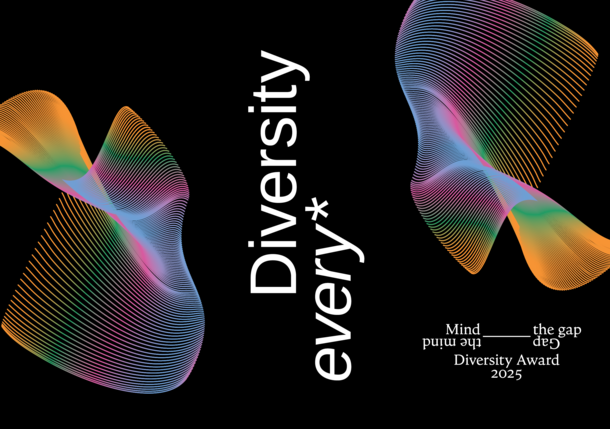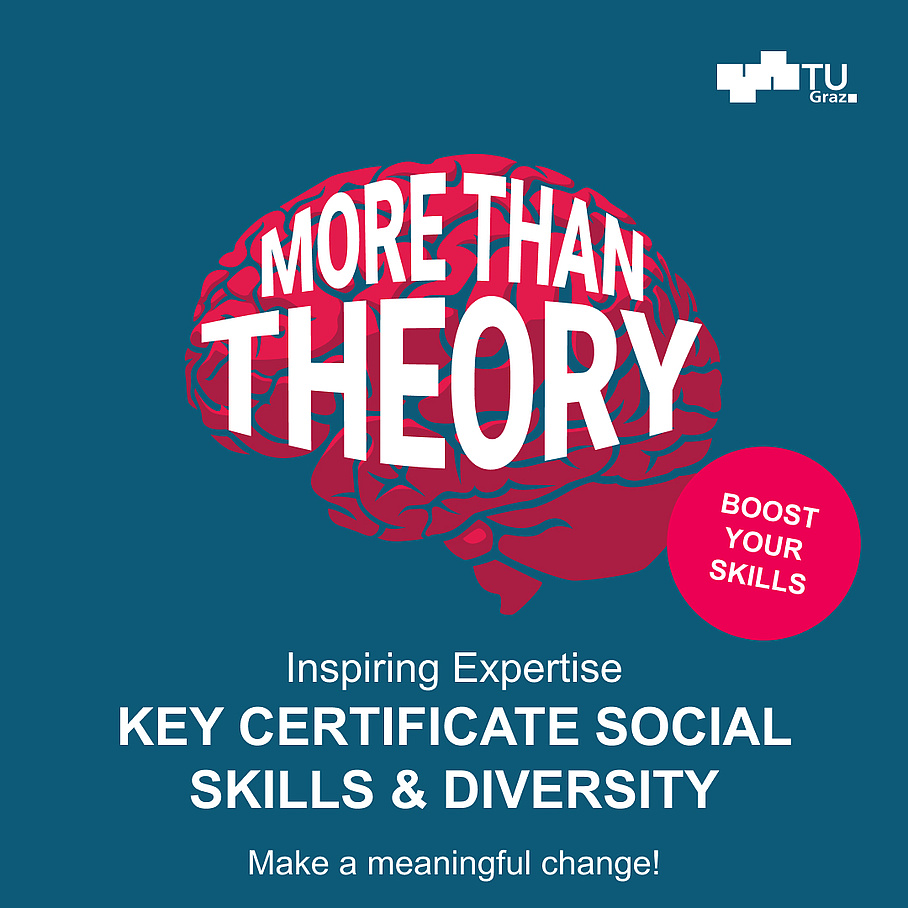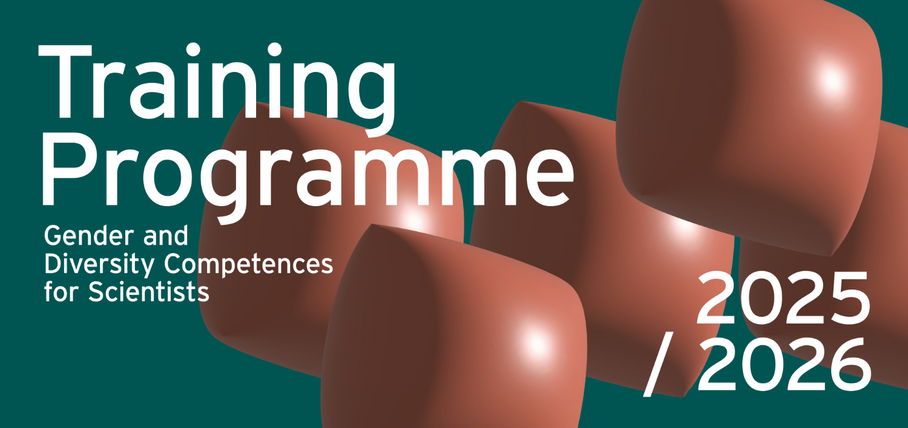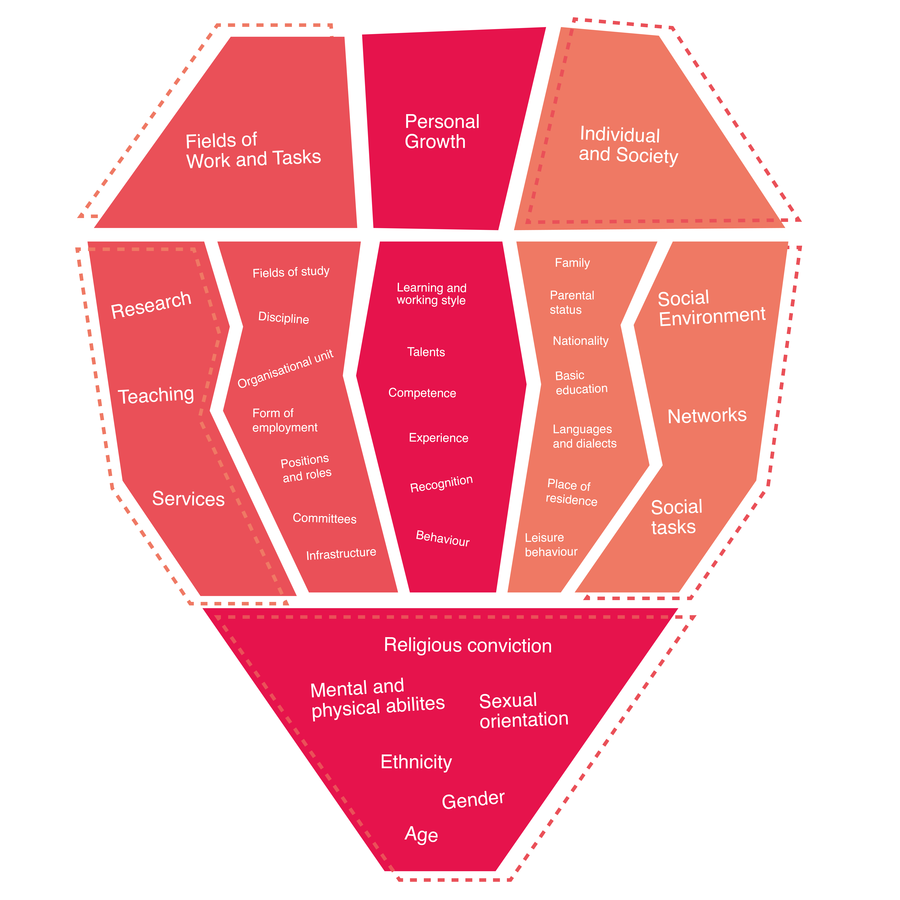This page provides an overview of our offers and the measures relating to gender, diversity and equity:
Contact
Equity, Youth, Care
Gender, Diversity & Equity Unit
Mandellstraße 5/I
8010 Graz
Achieving diversity as a key objective at TU Graz
TU Graz has set the achievement of diversity and equality at all levels as one of its key objectives and has defined its understanding of diversity in the TU Graz Affirmative Action Plan (in German: Gleichstellungsplan).
TU Graz is committed to managing diversity actively. The diverse biographical, social, and cultural backgrounds of its members and how these backgrounds influence the ways these members perceive, think, and act serve as a valuable source of innovation in research and teaching, as well as in university life.
Diversity at TU Graz
This diversity stands for variety, on the one hand, and for a conscious perception of differences, on the other hand. Some of these differences are more easily recognised, such as those based on physical characteristics, language, age, or gender, and some are addressed in legal provisions that offer clear protection against discrimination.
Other differences are rarely recognised “at first glance”, but are extremely important for people working together in an organization like TU Graz, such as experiences, knowledge, skills, social skills, networks, or social and professional status.
Due to the low proportion of women in the university's core research and teaching areas, gender continues to be one of the most relevant aspects of diversity at TU Graz. This is why we consciously refer to “gender and diversity”, and women are explicitly promoted.
Legal Bases
Our work is based on legal regulations, binding guidelines and strategic goals of TU Graz. These include:
- the Mission Statement of TU Graz
- the Code of Conduct at TU Graz
- the Action Plan for the Advancement of Women
- the Affirmative Action Plan, in German: Gleichstellungsplan
- the Gender Equality Plan (GEP)
- the Development Plan, in German: Entwicklungsplan
- the The Universities Act 2002, in German: Universitätsgesetz 2002
- the Sustainable Development Goals by the United Nations
- the Recommendations of the Higher Education Conference on broadening gender competence in higher education processes, in German: HSK-Empfehlungen zur Verbreiterung der Genderkompetenz
Diversity in Research and Teaching
We offer support for integrating diversity into studies, research and teaching. This includes courses, further training, materials, individual counselling and an award for particularly successful projects.

Mind the Gap – Diversity Award
Every year, TU Graz honours teams or individuals for projects, teaching or research related to human factors in technology and natural sciences.
The five prizes of 750 to 1,500 euros (for teams) are announced annually on the occasion of International Women's Day on 8 March and awarded in autumn.
The award winners of recent years
Students and employees of TU Graz can find further details on the prize and the call for entries in the Intranet TU4U.
Gender and Diversity Sensitivity Training for Scientists
In cooperation with the Gender Workshop Graz, TU Graz has developed the course “Gender and Diversity Skills for Scientists at TU Graz”. The course is held in German. Please find more information on the German website.

Certificate for Key Competencies in Social Skills and Diversity for students in all disciplines
The Certificate includes courses on teamwork, diversity and leadership skills and connects to all degree programmes at TU Graz.
More on the certificate for key competencies
Support provided for integrating diversity and gender aspects into research
In addition to individual counselling, we also offer materials such as the handbook for diversity-sensitive research. 18 concrete examples from the fields of technology and science are also available online (German and English).
More on diversity in research projects
Further offers in teaching
Gender- and diversity-sensitive didactics for teachers is offered at the Teaching Academy. You can find all offers here: In-house training
Support provided for integrating diversity and gender aspects into teaching: Teachers can take advantage of individual counselling or use the materials provided (handbook for diversity-sensitive teaching)
Visiting professorships: maximum 4-month visiting professorships with a gender and diversity focus
The Service Point for Accessible Learning has compiled a guide to inclusive teaching (in German: Leitfaden für eine inklusive Lehre) that provides concrete and practical suggestions on how courses for students with disabilities and/or chronic and mental illnesses can be designed to be inclusive and as accessible as possible. The Service Point also offers individual consultations on this topic.
Gender and Diversity Competences Training for Scientists
The training programme provides extensive know-how in the field of gender and diversity with relevance in technical and scientific fields. With the knowledge they acquire, graduates contribute to making everyday teaching and research more inclusive and diversity-conscious.
The course is aimed in particular at scientists at TU Graz and, in the sense of forming a cross-university network, at scientists at affiliated research institutions and regional partner universities. The training is held in cooperation with the GenderWerkstätte Graz and will start in September 2025 for the first time in English.
The call for applications is currently open.

The most important information on the training programme No.4 can be found in the 2025/2026 flyer.
Additional details can be found in the extended training description.
Key aspects of the training programme:
- Basic knowledge of diversity dimensions, exclusions and privileges
- Gender- and diversity-conscious personnel selection, team leadership and teamwork
- Design of student-centered, diversity-conscious teaching
- Identification of gender and diversity aspects in one's own research and implementation of these aspects in research proposals
- Ethical aspects of technology design
- TU Graz references are established through the use of documents and data that have already been produced inhouse (e.g. handbooks, reports). In addition, individual measures are presented in more detail by guests of TU Graz
Further information on the training
- Scope: 6 one-and-a-half-day modules, two-hour kick-off and two-hour closing event as well as accompanied and unaccompanied peer group meetings between the modules and supplementary fireside chats, which are also open to previous graduates
- Timeframe: Training No. 4 starts in fall 2025, runs until June 2026 and concludes with an official certificate handover event in fall 2026.
- Target groups: Scientists at TU Graz, affiliated research institutions and regional cooperation universities, university teachers and researchers from the doctorate/PhD onwards, for scientists in career positions the course can be accredited for the qualification agreement
- Application and submission deadline: At TU Graz, an official nomination is made by the deans of the faculties. Academic staff of affiliated research institions can be nominated by the respective management. Interest in the course can also be expressed at any time to the contact person at the Equity, Youth, Care Unit. If possible, places will also be made available to interested parties from regional partner universities.
- Costs: The course is free of charge for scientists of TU Graz and for those of affiliated research institutions. Participants from partner universities have to pay a participation fee.
- Completion: The course is usually completed with a practical assignment and the certificate Gender and Diversity Competencies for Scientists in Engineering and Natural Sciences.
Projects and measures for diversity management and gender mainstreaming
Gender and diversity are always relevant when working in the administration of a university. The AG Gender and Diversity was set up as a university-wide feedback group for the Rectorate on these topics.
The Gender, Diversity & Equity Unit is the internal contact point for advice on the gender-sensitive and diversity-conscious implementation of projects and measures. On request, the unit also organises workshops on gender and diversity for organisational units of TU Graz and cooperations.
Measures on gender diversity and LGBTQIA+
TU Graz is committed to welcoming all people, regardless of their gender and sexuality, and to reducing structural inequalities. To this end, measures are taken in the areas of promoting young talent, personnel development and infrastructure, e.g.:
- Gender-neutral Language and Images: All genders – including transgender, intergender and non-binary people – should be addressed equally and made visible using language and images. To help with this, there is a chapter dedicated to gender-sensitive writing in the corporate wording of TU Graz.
- All gender toilets: For transgender, intersex and non-binary staff, students and guests: There are twelve publicly accessible all-gender toilets, some of which are equipped with changing tables: go.tugraz.at/AllGenderToilets
- Exchange platform “More gender diversity in Higher Education” (GenderNow!+): Recurring meetings are held with transgender, intersex and non-binary people and university representatives to develop measures on an equal footing and give participants a voice.
Equal opportunities report of TU GRAZ
The Equal Opportunities Report (in German: Gleichstellungsreport) of TU Graz prepares statistical data on the composition of the university and maps developments in studies, employee groups and decision-making bodies according to various diversity categories. The first report (2022/23) focuses on gender. The report is available in German: Gleichstellungsreport 2022/23
An even more detailed version for internal use is available on the intranet TU4U.
Info portal: Sexual harassment and sexualised violence
Awareness-raising, information, and training opportunities
Sexual harassment is still considered a ‘taboo’ topic, and many people do not know very much about the subject. For these reasons, you will find information and learn how you can support our efforts to promote a respectful university culture on the Info Portal: Sexual Harassment and Gender-based Violence.
Advancement of women
The advancement of women is important to ensure equal opportunities in science and to fully realise the potential of talented women. It helps to reduce gender inequalities and create a more diverse, innovative research landscape. It also promotes an inclusive working environment that recognises and supports all talents.
You can find further information under Advancement of Women in Academia.
Leading Women
Career management programme for female scientists at TU Graz in management positions and with professorships and tenure track positions
Potenziale Programme
The diverse programme on the topics of promoting young talent, career planning, advancement of women* and gender competence as well as gender mainstreaming is carried out by the Coordination Centre for Gender Studies and Equal Opportunities at the University of Graz.
Details and information on registration can be found in the event calendar of the the Coordination Centre in German: Koordinationsstelle für Geschlechterstudien und Gleichstellung
Tenure Tracks for Women
n order to promote academic careers for women at TU Graz, the university advertises tenure tracks specifically for women. A tenure track is a “post-doc” position with the possibility of further academic progression.
Peer Coaching for Female Students at TU Graz
Looking for exchange and support? Women get together – become part of our peer coaching network!
Dates: instagram.com/tugrazpeercoaching
Interested in becoming a peer coach yourself? The training starts in mid-October. Apply by the end of September at: gabriele@burgsteiner.at
Strategic career planning for female doctoral candidates
Workshops for female doctoral candidates. Further information on page Advancement of Women in Academia
Cooperation
Genderplattform
Platform for institutions that support gender equality, the advancement of women, and gender research at Austrian universities: genderplattform.at
GenderNow! und GenderNow!+
Platform for institutions to support gender equality, equal opportunity, and gender studies at the Graz universities and universities of applied sciences. Joint campaigns and events around March 8 and beyond.
WomenUniverse
The alumni women's network of TU Graz - WomenUniverse - is aimed at female graduates, female students and all women who are interested in the connection between science and business. WomenUniverse
Virtual Inclusion Office (Unite!)
Alliance of nine technical universities in Europe: www.unite-university.eu

